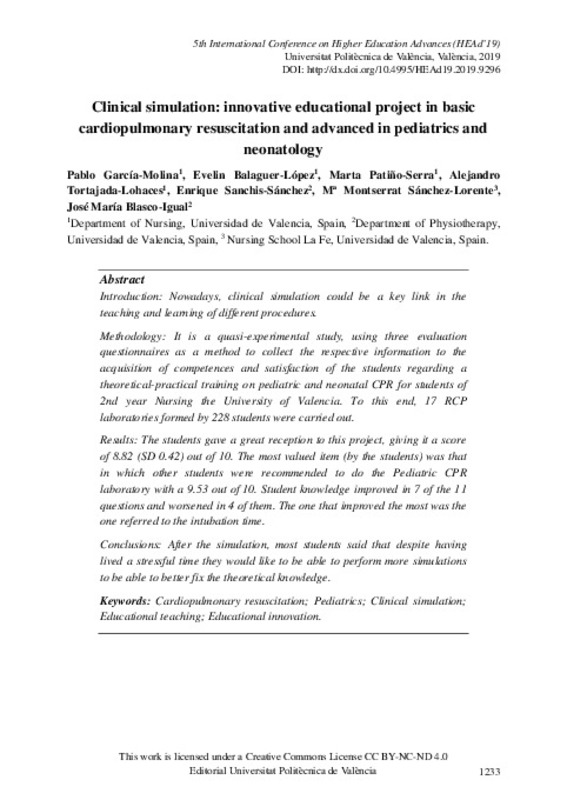JavaScript is disabled for your browser. Some features of this site may not work without it.
Buscar en RiuNet
Listar
Mi cuenta
Estadísticas
Ayuda RiuNet
Admin. UPV
Clinical simulation: innovative educational project in basic cardiopulmonary resuscitation and advanced in pediatrics and neonatology
Mostrar el registro sencillo del ítem
Ficheros en el ítem
| dc.contributor.author | García-Molina, Pablo
|
es_ES |
| dc.contributor.author | Balaguer-López, Evelin
|
es_ES |
| dc.contributor.author | Patiño-Serra, Marta
|
es_ES |
| dc.contributor.author | Tortajada-Lohaces, Alejandro
|
es_ES |
| dc.contributor.author | Sanchis-Sánchez, Enrique
|
es_ES |
| dc.contributor.author | Sánchez-Lorente, Montserrat
|
es_ES |
| dc.contributor.author | Blasco-Igual, José
|
es_ES |
| dc.date.accessioned | 2019-07-30T06:42:12Z | |
| dc.date.available | 2019-07-30T06:42:12Z | |
| dc.date.issued | 2019-07-05 | |
| dc.identifier.isbn | 9788490486610 | |
| dc.identifier.issn | 2603-5871 | |
| dc.identifier.uri | http://hdl.handle.net/10251/124439 | |
| dc.description.abstract | [EN] Introduction: Nowadays, clinical simulation could be a key link in the teaching and learning of different procedures. Methodology: It is a quasi-experimental study, using three evaluation questionnaires as a method to collect the respective information to the acquisition of competences and satisfaction of the students regarding a theoretical-practical training on pediatric and neonatal CPR for students of 2nd year Nursing the University of Valencia. To this end, 17 RCP laboratories formed by 228 students were carried out. Results: The students gave a great reception to this project, giving it a score of 8.82 (SD 0.42) out of 10. The most valued item (by the students) was that in which other students were recommended to do the Pediatric CPR laboratory with a 9.53 out of 10. Student knowledge improved in 7 of the 11 questions and worsened in 4 of them. The one that improved the most was the one referred to the intubation time. Conclusions: After the simulation, most students said that despite having lived a stressful time they would like to be able to perform more simulations to be able to better fix the theoretical knowledge. | es_ES |
| dc.description.abstract | [ES] Introducción: Hoy en día, la simulación clínica podría ser un eslabón clave en la enseñanza y el aprendizaje de diferentes procedimientos. Metodología: Este es un estudio cuasi-experimental, que utiliza un cuestionario de evaluación como un método para recopilar la información sobre el respeto de la adquisición de las competencias y la satisfacción de los estudiantes. Neonatal para estudiantes del 2º año de Enfermería de la Universidad de Valencia, para ello se capacitaron en 17 laboratorios de RCP, conformados por 228 alumnos. Resultados: Los estudiantes dieron una gran acogida a este proyecto, otorgando una puntuación de 8.82 (SD 0.42) sobre 10. El elemento más valorado (por los estudiantes) fue aquel en el que se recomendó a otros estudiantes que realizarán el laboratorio de RCP pediátrica con a 9.53 de 10. El conocimiento de los estudiantes mejoró en 7 de las 11 preguntas y empeoró en 4 de ellas. El mejor resultado fue el resultado de la intubación. Conclusiones: los estudiantes en general, después de la simulación, después de que se tiene que mantener el tiempo, el poder de los aspirantes se puede realizar con más simulaciones para poder mejorar los conocimientos teóricos. | es_ES |
| dc.format.extent | 8 | es_ES |
| dc.language | Inglés | es_ES |
| dc.publisher | Editorial Universitat Politècnica de València | es_ES |
| dc.relation.ispartof | HEAD'19. 5th International Conference on Higher Education Advances | es_ES |
| dc.rights | Reconocimiento - No comercial - Sin obra derivada (by-nc-nd) | es_ES |
| dc.subject | Higher Education | es_ES |
| dc.subject | Learning | es_ES |
| dc.subject | Educational systems | es_ES |
| dc.subject | Teaching | es_ES |
| dc.subject | Cardiopulmonary resuscitation | es_ES |
| dc.subject | Pediatrics | es_ES |
| dc.subject | Clinical simulation | es_ES |
| dc.subject | Educational teaching | es_ES |
| dc.subject | Educational innovation | es_ES |
| dc.title | Clinical simulation: innovative educational project in basic cardiopulmonary resuscitation and advanced in pediatrics and neonatology | es_ES |
| dc.type | Capítulo de libro | es_ES |
| dc.type | Comunicación en congreso | es_ES |
| dc.identifier.doi | 10.4995/HEAD19.2019.9296 | |
| dc.rights.accessRights | Abierto | es_ES |
| dc.description.bibliographicCitation | García-Molina, P.; Balaguer-López, E.; Patiño-Serra, M.; Tortajada-Lohaces, A.; Sanchis-Sánchez, E.; Sánchez-Lorente, M.; Blasco-Igual, J. (2019). Clinical simulation: innovative educational project in basic cardiopulmonary resuscitation and advanced in pediatrics and neonatology. En HEAD'19. 5th International Conference on Higher Education Advances. Editorial Universitat Politècnica de València. 1233-1240. https://doi.org/10.4995/HEAD19.2019.9296 | es_ES |
| dc.description.accrualMethod | OCS | es_ES |
| dc.relation.conferencename | Fifth International Conference on Higher Education Advances | es_ES |
| dc.relation.conferencedate | Junio 26-28,2019 | es_ES |
| dc.relation.conferenceplace | València, Spain | es_ES |
| dc.relation.publisherversion | http://ocs.editorial.upv.es/index.php/HEAD/HEAD19/paper/view/9296 | es_ES |
| dc.description.upvformatpinicio | 1233 | es_ES |
| dc.description.upvformatpfin | 1240 | es_ES |
| dc.type.version | info:eu-repo/semantics/publishedVersion | es_ES |
| dc.relation.pasarela | OCS\9296 | es_ES |








